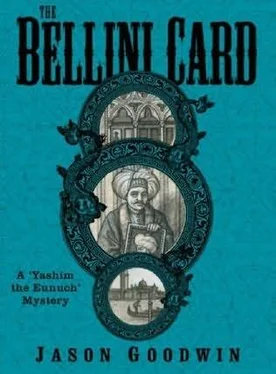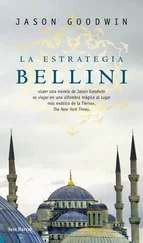Jason Goodwin - The Bellini card
Здесь есть возможность читать онлайн «Jason Goodwin - The Bellini card» весь текст электронной книги совершенно бесплатно (целиком полную версию без сокращений). В некоторых случаях можно слушать аудио, скачать через торрент в формате fb2 и присутствует краткое содержание. Жанр: Исторический детектив, на английском языке. Описание произведения, (предисловие) а так же отзывы посетителей доступны на портале библиотеки ЛибКат.
- Название:The Bellini card
- Автор:
- Жанр:
- Год:неизвестен
- ISBN:нет данных
- Рейтинг книги:5 / 5. Голосов: 1
-
Избранное:Добавить в избранное
- Отзывы:
-
Ваша оценка:
- 100
- 1
- 2
- 3
- 4
- 5
The Bellini card: краткое содержание, описание и аннотация
Предлагаем к чтению аннотацию, описание, краткое содержание или предисловие (зависит от того, что написал сам автор книги «The Bellini card»). Если вы не нашли необходимую информацию о книге — напишите в комментариях, мы постараемся отыскать её.
The Bellini card — читать онлайн бесплатно полную книгу (весь текст) целиком
Ниже представлен текст книги, разбитый по страницам. Система сохранения места последней прочитанной страницы, позволяет с удобством читать онлайн бесплатно книгу «The Bellini card», без необходимости каждый раз заново искать на чём Вы остановились. Поставьте закладку, и сможете в любой момент перейти на страницу, на которой закончили чтение.
Интервал:
Закладка:
“And beauty makes me weak.”
“No. It’s thinking about it that unbalanced you.”
“Unbalanced me! Anything else I should know, maestro?”
He hesitated. There was, in fact, something else he had discerned about her movements: but then, he had never fought a woman before.
“Why don’t you kill me, Yashim Pasha?”
She said it so suddenly that Yashim had no time to react.
“How can you be so sure of me?” he said.
“Ah! So sure?” She laughed again, but without merriment. “Thank you, Antonio. That is all.”
She poured the coffee into two tiny luster cups. Her hand barely shook.
She picked up Yashim’s cup and brought it to him, with a little bow.
They were very close.
“Eletro,” she said. “A man called Popi Eletro.”
She sauntered back to the tray and picked up her own cup.
“Then I knew,” she added, taking a sip. “Boschini was drowned. Count Barbieri was killed, leaving my house. But they were my people.”
“Your people?” Yashim was confused.
“Like pashas, Yashim.” She smiled. “But Eletro was one of-the reaya.”
Sheep: the reaya, nonbelievers whom the sultan was bound to rule. A common man.
“And then, of course, I knew,” she said. “The Fondaco dei Turchi. You can see it from this window, Yashim Pasha. Come.”
A ragged cheer went up outside as she flung back the window and leaned out. The contessa raised a slender hand.
“You see that ruin? In centuries past, Yashim Pasha, the fondaco was your caravanserai in Venice, the han of Ottoman trade. Secure and secluded-but magnificent, of course. That’s where we held the party.”
Yashim looked out. The barges had gone; a few gondolas bobbed on the gentle waters of the Grand Canal. Still the people were there, crowding the pontoon almost opposite the Palazzo d’Aspi.
“Cement the union!” a gondolier suggested, his voice lost in the laughter of his friends.
Yashim withdrew his head.
“I know the fondaco,” he said. “What’s left of it. Someone’s been using the hammam as a prison. A private prison.”
She shrugged. “It wouldn’t surprise me.”
“The party, Contessa?”
For the first time she looked wary.
“Eletro owned the building. That’s why he was there.”
“Eletro?” Yashim sounded incredulous.
She shrugged lightly. “The fondaco is a ruin. And Venice is cheap.”
Yashim said nothing, studying her face.
She returned his gaze. “Whatever you see, Yashim Pasha, it is not fear.”
“No,” he admitted.
“Boschini and Barbieri were the other players. And when Eletro was murdered, then I knew.”
“But why have a party in that ruin?”
She shrugged. “Com’era, dov’era.”
As it was, where it was. Yashim had heard that phrase before.
“I-we-wanted to pretend, for a moment, that nothing had really changed.”
“We?”
“The duke and I.”
“The duke?”
“The Duke of Naxos. Our guest, in Venice.”
Yashim’s head was spinning. “But the Duke of Naxos-” he began.
“Died three hundred years ago, yes. Joseph Nasi, a Jewish financier. Sultan Selim the Sot made him Duke of Naxos, for his assistance in the seizure of Cyprus.”
“So this duke-your guest-was an impostor? And you knew it?”
She gazed at him appraisingly. She held out her hands. “Perhaps you really have come to save me,” she said.
89
An old woman complained to the police that a beggar had taken up residence on her steps and wouldn’t move.
He was sitting on the steps with his head on his knees. By the time Scorlotti reached him he was locked into place; only his arms had risen weirdly, like the arms of a devotee, as the rigor set in.
There wasn’t a mark on him except for a dull purple flush on the back of his neck and a faint bruise over his Adam’s apple. His papers, and a small amount of change, were still in his pockets.
The old woman slammed the door and turned the lock; Scorlotti heard the bolts shoot home.
He took the corpse to the mortuary in a gondola.
“Naxos belonged to the Venetians, until the reign of Suleyman,” Yashim said slowly. “Only the Venetians appointed a Duke of Naxos, until it fell to the Ottomans. After that, there was only one. Joseph Nasi. But when Nasi died, the title would have, I don’t know, lapsed.”
“I suppose so.” She seemed amused. “Or else-it was added to the many titles already possessed by the man who bestowed it on Nasi.”
“Sultan Selim?”
“Sultan,” she intoned, closing her eyes, “padishah, lord of the two seas and the two continents, ruler of Mingrelia and Hungary, in the Crimea, Khan, and Voivode in the Danubian principalities. He was the Duke of Naxos.”
“So now-” Yashim was struggling to comprehend. “The Duke of Naxos
…?”
She gave an equivocal shrug. “Would be the sultan. Or his son, perhaps.”
“I don’t believe it,” Yashim said.
“Are you playing with me, Yashim Pasha?”
But Yashim could only stare.
“Fourteen times since the conquest of Istanbul, the Aspi family has provided Venice with a bailo in the city,” Carla continued. “Istanbul has been our second home. One of my ancestors, Alvise d’Aspi, was the richest merchant prince in Pera-Suleyman the Magnificent went to visit him, Yashim Pasha. They were friends. My father, also Alvise, was the last bailo of the Republic. He knew Selim III well; they played music together. Can you believe that? Or have times so far changed that men do not remember?”
“I believe it,” Yashim said. His mouth was dry.
She gestured to the arms on the wall behind him. “The Aspis have not been afraid to fight, either. We were not all merchants and ambassadors, Yashim Pasha. We supplied the Republic with admirals and generals, and when Venice was pressed too hard, we have helped make wars to win peace.”
She turned to face him. “I am the last of the Aspis. That is-my pride, if you will. But you must believe me when I tell you that I knew the Duke of Naxos. I knew him by instinct, as if he were my own son.”
Yashim’s eyes traveled over the swags of weaponry, the golden cornices, the fantastical trompe l’oeil-and saw nothing.
Abdulmecid! The Duke of Naxos, Crown Prince of the throne of Osman?
The shy, retiring boy-that pale youth who had been afraid to watch his own father die-had come to Venice, in disguise!
It was impossible. No one of the Ottoman line had ever stepped beyond the borders of the empire-unless to conquer. The idea was mad!
And yet… and yet.
Sultans disguised themselves. It had happened: incognito, they had moved through the markets and the mosques, gauging what the people said.
Incognito! In Venice at Carnevale everyone was incognito-why, incognito was a Venetian word!
And Abdulmecid enjoyed a freedom his father had never known, a freedom that would disappear on his elevation to the throne. As sultan, he would be watched every minute of the day.
Abdulmecid spoke French.
“The duke. Did he win-or lose?”
“At cards?” She looked surprised. “He played well.”
“He won? Money?” Yashim had never gambled.
“I said he played well, Yashim Pasha. But Barbieri is very good-and the stakes were high.”
“The party, Contessa, was arranged by you?”
“You could say I inspired it. The duke had a cicerone-I suggested it to him. He made the arrangements with Eletro.”
“But why did Eletro come? He wasn’t an aristocrat, as you said. He was a sort of criminal.”
“He plays cards. And it was Carnevale. A period of misrule. It used to be glamorous-and very long. A long season of parties, gambling, drinking. Everyone goes masked-that’s part of the fun, I suppose.”
Читать дальшеИнтервал:
Закладка:
Похожие книги на «The Bellini card»
Представляем Вашему вниманию похожие книги на «The Bellini card» списком для выбора. Мы отобрали схожую по названию и смыслу литературу в надежде предоставить читателям больше вариантов отыскать новые, интересные, ещё непрочитанные произведения.
Обсуждение, отзывы о книге «The Bellini card» и просто собственные мнения читателей. Оставьте ваши комментарии, напишите, что Вы думаете о произведении, его смысле или главных героях. Укажите что конкретно понравилось, а что нет, и почему Вы так считаете.












